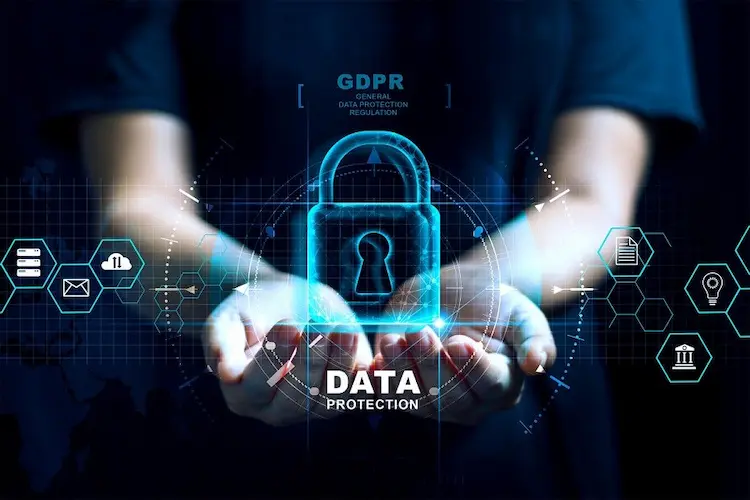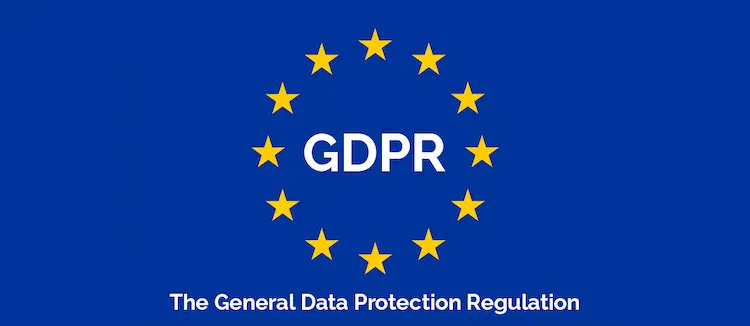Do you remember the song Connected from Stereo MCs? If you notice the lyrics, you can say that everything today is becoming more and more connected, and data has become the currency in modern businesses.
Every day, something can turn up as a vulnerability in your system, and as the threats are rising and becoming more sophisticated – so are the systems and regulations against them. One of those rules is The General Data Protection Regulation (GDPR), and it has stepped out as some sort of champion.
Having the curiosity to find out what it really is and how you can use the force of that champion – is already fulfilling enough; look at you – you’re reading this article, for example.
So let’s start from the beginning.

And There it Was – The GDPR
Let’s start it simple and just say – the GDPR is a set of rules that the European Union made to protect people’s privacy when it comes to their digital information. Every member country of the EU has to follow these rules.
And the rule applies to any company that handles or even plans to handle the personal information of people in the EU, regardless of where the company is located.
So, the regulation has clear rules for how companies should handle personal data. And these rules include getting permission from people – before using, collecting, or sharing their data.
Also, businesses are obligated to verify the accuracy and currency of the customers’ personal information in their possession and provide customers with the means to access and review this information.
They must prevent unauthorized individuals from seeing, losing, or destroying personal data.
The General Data Protection Regulation (GDPR) provides individuals with the right to file complaints with supervisory authorities in the event that they believe their rights have been infringed upon.

Are you still wondering, what is the GDPR? We are only able to add that the regulation was accepted a few years ago, on April 14, 2018, and that it started being put into effect on May 25, 2018.
The General Data Protection Regulation (GDPR), which is a brand-new piece of legislation, replaced the Data Protection Directive in 1995.
https://edps.europa.eu/data-protection/data-protection/legislation/history-general-data-protection-regulation_en
But What’s the Significance of GDPR for Cybersecurity?
Besides bolstering EU data protection standards by giving people more say over their personal data and establishing new rights, this would be an enormous benefit in a number of other ways as well.
For example, one of the key aspects of the GDPR is that it is all about making sure data is secure. Every company that deals with personal information must put in place the right technical and organizational measures to make sure that the data remains private, accurate, and accessible.
And it includes a lot of aspects of measures, such as:
- Concerns relating to the use of encryption
- Taking measures to restrict access to only desired parties
- Conducting routine checks for potential vulnerabilities
- Having contingency plans in place in case something goes wrong
GDPR compels businesses to devote more attention to cybersecurity by mandating the implementation of stringent security measures. This is due to the fact that such measures help reduce the likelihood of cyberattacks and data breaches.
Along with that, the GDPR requires organizations to inform the appropriate authorities and affected individuals about any data breaches within a certain amount of time.
And nobody wants to take the risks that can develop into significant issues for both individuals and businesses.
Because of this requirement, everything becomes more transparent and accountable whenever there is a breach of security.

It helps authorities understand how serious the breach is and what they should do about it.
Because of the risk of incurring significant penalties and damage to their reputations if they fail to comply with the requirements of GDPR, businesses have an increased incentive to place a greater emphasis on cybersecurity.
Even if they are located in a country outside of the EU, companies that process the personal information of EU citizens are subject to this regulation. GDPR has had a significant impact globally, elevating the importance of data protection and cybersecurity measures.
What is the Impact of GDPR on Businesses and Consumers?
So, every organization that handles data needs to have a Data Protection Officer (DPO), and they also need to have plans in place to manage risks and respond to any incidents that may occur.
It is necessary for the DPO to be informed of the activities of the organization that are associated with the processing of personal data, and individuals who have concerns or questions regarding their personal data should be able to communicate with the DPO.
These recommendations are intended to provide assistance to organizations in dealing with data breaches and adhering to principles related to the reduction and maintenance of data accuracy.
The GDPR includes a provision that states any incident involving data must be reported within 72 hours, regardless of what caused the incident.
So, according to GDPR, personal data needs to be:
- Valid and required for the reasons it is being used
- Collected with accuracy and care
- Handled in a clear, reliable, and just way
- Erased or wiped out when no longer necessary and regularly checked
People have the right, and businesses should honor that right by allowing for the correct handling of personal data.
Data Protection
In order for regulators to have access to records of how businesses comply with the requirements of GDPR and any other actions related to the regulation, businesses should keep records of those compliance efforts.
Also, they should always keep everything secured and tucked in – and they must tell the government as soon as possible about certain types of data breaches.
Overall, it’s the responsibility of businesses to make sure they follow GDPR rules to protect the privacy of people’s personal data.
Are there any Challenges with the Implementation of GDPR?
The GDPR aims to give people more say over their personal data but also imposes new duties that are complex and have far-reaching effects, making compliance challenging.
One of the issues was the limited amount of time allowed for compliance. The amount of time that many businesses had to prepare was only a few months.
A significant number of organizations, on the other hand, were unable to comply with the rule because they were unaware of it until it was too late.
Another issue is the expense that comes with obeying the regulations. The GDPR mandates that companies invest money in cutting-edge data protection tools and strategies, as well as in internal procedures, to ensure that they are adhering to the regulations.
Costs like this can be a significant burden for enterprises of all sizes, but especially for smaller and medium-sized businesses. Also, organizations are responsible for mitigating the risk of not adhering to the guidelines.

Following the successful implementation of GDPR compliance within an organization comes the ongoing challenge of ensuring continued compliance with the regulation. This entails conducting routine checks on the company’s internal procedures and data flows to ensure that they are adapting appropriately to any new regulations that may be issued.
Protecting personal data and avoiding penalties requires doing this, which can be challenging and resource-intensive. However, it is essential.
Companies that do not comply with the GDPR may be subject to fines of up to 4% of their annual global revenue or 20 million euros, whichever is greater.
We can agree that these penalties can prevent companies from violating GDPR, but they may also discourage companies from taking risks and generating new ideas.
The lack of public trust is another issue. People are concerned about the security of their personal data following high-profile data hacks at companies like Equifax and Facebook.
The GDPR is an effort to give consumers more control over how businesses use their personal information.
GDPR is a Compromise Between Companies & People
If you look closely, you cannot help but come to the conclusion that the GDPR is a significant step forward in terms of cybersecurity and that it will be absolutely necessary for ensuring that we can make use of digital services online without risking our personal information.
Compliance with GDPR is contributing to the creation of a more secure online environment because it requires businesses to develop robust cybersecurity measures that protect personal data, guarantee the secure transmission of information, and monitor any changes or breaches in infrastructure with speed and accuracy.
We can use the success of GDPR as a model for other countries that are engaged in the process of modernizing their own digital policies in order to better serve the interests of their citizens.